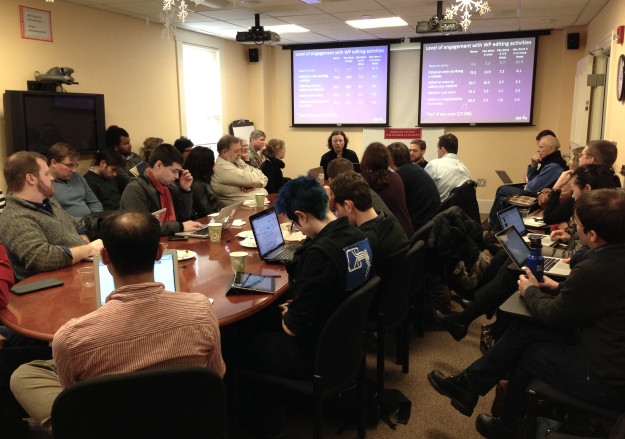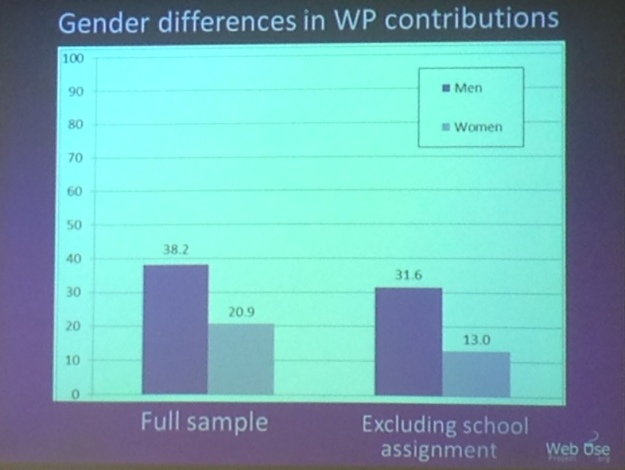Guest post by Laura Hale
I write about women’s sport on English Wikipedia. Unlike scientists, artists, and other professional women, the media have paid little attention to how Wikipedia treats female athletes. The problem is particularly acute in terms of article naming and categorization because English Wikipedia has this tendency to treat sportspeople as men by default, with women being treated as inherently inferior. The best example of this is the national team naming structure, which almost always has the genderless national team article about men, and the gendered article name about women. This occurs despite the fact that by rule almost all of these sports are segregated by gender. If you’re a female sportsperson, that sends a horrifying message.
This pattern is often repeated when it comes to categories. Men are not categorized by gender, while women are systematically categorized by gender. Or when a male and female category exists, the men stay in the main category and the women are moved out. The worst I’ve ever seen was when all the women were systematically moved out of “softball players” and into “female softball players”, leaving only articles about men. This happened despite the fact that softball has historically been a women’s game. Again, the message is that women are supposedly inferior and not equal to their male counterparts. This default language part is particularly troubling because it creates barriers. Despite the verifiability of the fact that sport is segregated by gender and what seems to be an inherently neutral position of gender specifying the teams, the argument on Wikipedia amounts to the fact that men’s teams are inherently more notable, and are thus primary topics. Neutrality, being specific, following verifiability should be secondary to serving the reader’s interest in finding the most notable team without gender in play.
I’ve seen a fair amount of work discussing the differences between male and female artists and scientists, but none on national teams. The Wikipedia content for the most popular sports is better for men, has more sources, has more pictures, on average is longer in length, and is created sooner than for articles about female members of national teams.
This situation is particularly appalling given the important role of exercise and participation in sport when it comes to women’s health. At the same time, women’s participation in sports and sports governance are often reflective of broader societal treatment of women that may not be as publicly visible elsewhere. Think about the story of the Saudi Arabian women being excluded from the Olympic team and the fatwas issued to prevent women from playing soccer in several countries in Africa. The portrayal on Wikipedia of women’s participation in sports is systematically marginalized in a way that it violates the “neutral point of view”, one of the five pillars for editing on Wikipedia. This is not good for Wikipedia, and broadly speaking, it is not good for women’s health issues globally.
It also discourages women from editing in sports topics because the sexism is so built into the system. Women get actively discouraged from participating and are being attacked for questioning the assumption that the default is male and should remain male because of the false premise that men’s sport is inherently superior. That’s not the sort of positive messaging that will get women contributing to articles about elite women in sports.
Further, issues on Wikipedia regarding women in sports appear to mirror problems faced by media and sports in general. This includes participation levels both at the athlete and administrator level. There has recently been a large discussion about media coverage of women in sports and the treatment of female sports journalists.
This is really, really problematic for sports and a situation not necessarily true in other domains. Scientists are not by rule segregated by gender in doing their work and in who they compete against. The same is true for popular culture topics, academia, art and other domains that have historically been the focus of gender gap work. Hence, on some level this feels worse than other forms of discrimination at the heart of categorygate (during which women novelists were moved out of the American novelists category} and few people seem to talk about it. My supposition would be that this is because of the people attracted to writing about the gender gap focus on areas of interest, which can play along feminist lines, and sports does not fit into that mold.
This is an area where I feel particularly passionate about because I feel it has largely been neglected in the gender gap narrative. That’s sad because I think sports public profile for bringing attention to women’s issue is huge. The Winter Olympics in Sochi, Russia, are starting on February 7 and we’re going to hear all these stories about strong, capable women who are the best at what they do in the world. Rarely does that happen on a global level where you hear so many stories about so many women. And the cultural implications for women’s involvement or lack of involvement in sport should be there. I’ve talked to a number of sportswomen and having a Wikipedia article is seen as a clear sign that they’ve made it. Validating our best is good, because it encourages more of them.
Laura Hale is a Ph.D. student at the University of Canberra, who is studying sport and social media. As a Wikipedian, she has created over 1,200 articles with over 40 percent of them about women. She has served as a Wikipedian in Residence for the Australian Paralympic Committee and the Spanish Paralympic Committee. She is also active in a leadership role in the Wikimedia movement, having served as the vice president of Wikimedia Australia, and the provisional chairperson of The Wikinewsie Group.


